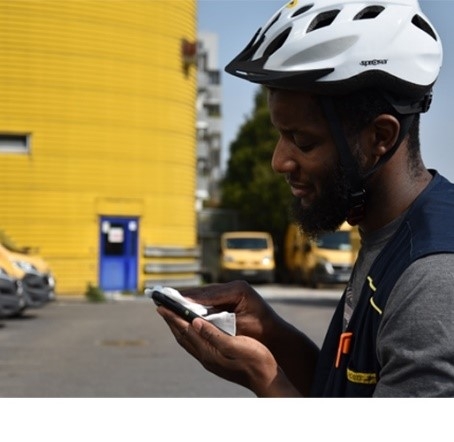Combating illiteracy and being accessible to all
Since its creation, La Poste has been evolving and changing to keep pace with major social and societal transformations. With the acceleration of digital use, the Group is taking action to tackle situations of illiteracy, entirely free of charge for beneficiaries:
detection of digital vulnerabilities and mediation in more than 600 post offices, mainly in priority urban neighbourhoods ;
413 post offices with the France Services label to facilitate access to rights and help people with their online administrative procedures with nine public service operators ;
4,081 local post offices equipped with self-service equipment : tablets in 3,000 post offices, digital islands in 1,235 post offices ;
95 Etapes numériques: digital rooms equipped for digital workshops for the general public and businesses ;
110 France Services digital advisers (currently being recruited) providing digital training in post offices and digital stages.
In 2023, La Poste provided free assistance to 646,000 people experiencing digital difficulties. Its goal is to support 1 million people a year by 2030. To give everyone access to basic digital tools, in complete confidence, La Poste has developed a set of free, fully secure platforms. It includes :
an @laposte.net mailbox, guaranteed for life, independent of access providers and whose content is not sold ;
The Digiposte application: a secure digital safe, 100% hosted in France on La Poste Groupe servers ;
La Poste Digital Identity: the first electronic identity to be qualified to a substantial level by ANSSI, verified by the postman or in the post office. It provides rapid access to more than 1,300 services available via FranceConnect (procedures relating to citizenship, health, local life, transport, retirement, family, work or energy), as well as La Poste services (receipt of electronic registered letters, access to the digital safe, Digiposte, mail forwarding, opening a La Banque Postale account) or offered by other service providers.
As a driving force for digital inclusion, La Poste is developing digital applications and services for seniors and people with disabilities. Ardoiz, the first tablet designed for seniors, is ergonomic and easy to use, with no keyboard or mouse, and is delivered by the postman to the user's home.
Developing the digital uses of postal workers

Every postal worker needs to master the digital technologies that are relevant to their job. Postmen and women, equipped with smartphones called Facteo, and customer service agents in post offices equipped with Smarteo, are benefiting from this digital transformation. These digital tools enable them to manage multiple operations and facilitate their work on the road or in the post office, by offering new services tailored to the needs of every French person.
At the same time, the Group has carried out its internal digital transformation. Already boasting a team of over 400 data and AI experts, La Poste Groupe has launched its School of Data and AI in 2022.
Ethical and trusted digital technology
The widespread use of smartphones and tablets is multiplying connection opportunities and Internet use has become an essential tool in everyday life : for communicating, working, shopping, travelling and carrying out administrative procedures, consult and manage your bank account, pay your bills and pay your taxes. Personal data is an essential component of the digital revolution. The business model of many free services, such as search engines, is based on exploiting and marketing users' personal data.

The omnipresence of the Internet has given rise to new challenges: data protection, transparency, mastery of digital tools, inclusion of senior citizens and vulnerable groups.
For more than a century, the postman's oath has guaranteed respect for the correspondence and money entrusted to La Poste. It has now been extended to electronic personal data. The company's commitment is matched by the honour of its employees.
As a leading public service operator and trusted third party, La Poste Groupe implements systems and technologies for an ethical and trusted digital environment. It undertakes to strictly respect the confidentiality of the data entrusted to it by its customers. In 2024, the Group updated its ethical framework, reinforcing its role as a trusted third party.
By bringing together the "Data" and "Trusted AI" Charters, the Group aims to guarantee the "ethical design" of its AI systems. In particular, the charter emphasises transparency, explicability and the fight against bias, while providing a framework for user protection.
Environmentally-friendly digital technology
Faced with dwindling resources, their carbon footprint and the consequences for biodiversity, sobriety and the circular economy are necessary for a more frugal digital world. Extending the lifespan, repairing, reconditioning, donating to charities. La Poste Groupe is reviewing its processes relating to the use of IT equipment to reconcile respect for planetary limits and digital inclusion.
Taking action on the use and management of electrical and electronic equipment
With almost 719,000 items of equipment, including telephones, computers, tablets, photocopiers, etc., by 2022, the Group has already taken concrete initiatives:
An action plan to increase the useful life of equipment: repairs, in-house recommissioning, software maintenance, security, preventive maintenance, raising awareness of eco-actions among users, etc.
Reuse : in 2023, a total of 29,000 digital equipment items were reused. La Poste also carried out 80 donation operations for the benefit of the SSE sector, which was able to recover 4,900 items of equipment.
Rigorous and exemplary management of its waste electrical and electronic equipment (WEEE). By 2023, 90% of La Poste Groupe's WEEE had been recovered (83% in the form of material recycling, 3% reuse, 4% incineration with energy recovery).
Specifications for the purchase of its IT equipment, making it possible to compare the carbon footprint of IT equipment before any purchase and integrating EcoLabel requirements.
Consideration of responsible digital technologies in training courses, with the possibility of certification.
In addition, La Poste offers the supply of reconditioned IT equipment, particularly to public purchasers who are now obliged not to purchase all their equipment new.
Implementing an approach to reduce the environmental footprint
Digital technology is having a growing impact on the planet, but it is also an essential tool in the ecological transition.
La Poste Groupe, a founding member of the Institut du Numerique Responsable, has put in place a structured approach to reduce the environmental footprint of its information and communication systems. This approach is based in particular on the gradual deployment of the Responsible Digital Label for the Group's IT Departments.

The Group's governance for a responsible digital environment was strengthened in 2023 by a steering committee for the IS sector. Responsible digital" referents have been appointed by their IT Department to contribute to the Group's responsible digital committee. This committee acts within the framework of the Group's commitment to ethical, inclusive and frugal digital technology, and contributes to the Group's sobriety plan with actions relating to the sobriety of IT equipment and the responsible management of user data.
For several years now, the Group has been measuring the environmental footprint of its IT assets. A new strategy has been adopted for the Group up to 2025. It will be rolled out across the Group's various divisions between 2024 and 2025.
Establishing responsible digital purchasing criteria
In order to reduce its environmental footprint, the Group is establishing responsible purchasing criteria. A repository of state-of-the-art CSR (Contract Notice) and Digital Responsibility (Consultation) criteria is gradually being put in place, and will eventually cover all IT purchases in addition to equipment (software, intellectual services, hosting, etc.). These criteria now include the key elements of the Group's responsible purchasing policy and responsible digital policy.
Encouraging digital eco-design and making digital services accessible
On the "datacenter" side, an initial approach was initiated by the Group at the end of 2019 with a view to assessing the performance and impacts of a datacenter (regardless of the type of service offered by the data centre: dry hosting and with data, facilities management, cloud/SAAS management).
The Group is also working on the eco-design of products and services, and is carrying out lifecycle analyses on certain offerings.
Finally, to meet its obligations in terms of digital accessibility (customers and postal workers), the Group has set up a team of testers specifically composed of employees with disabilities during the purchasing phase of products and services.
